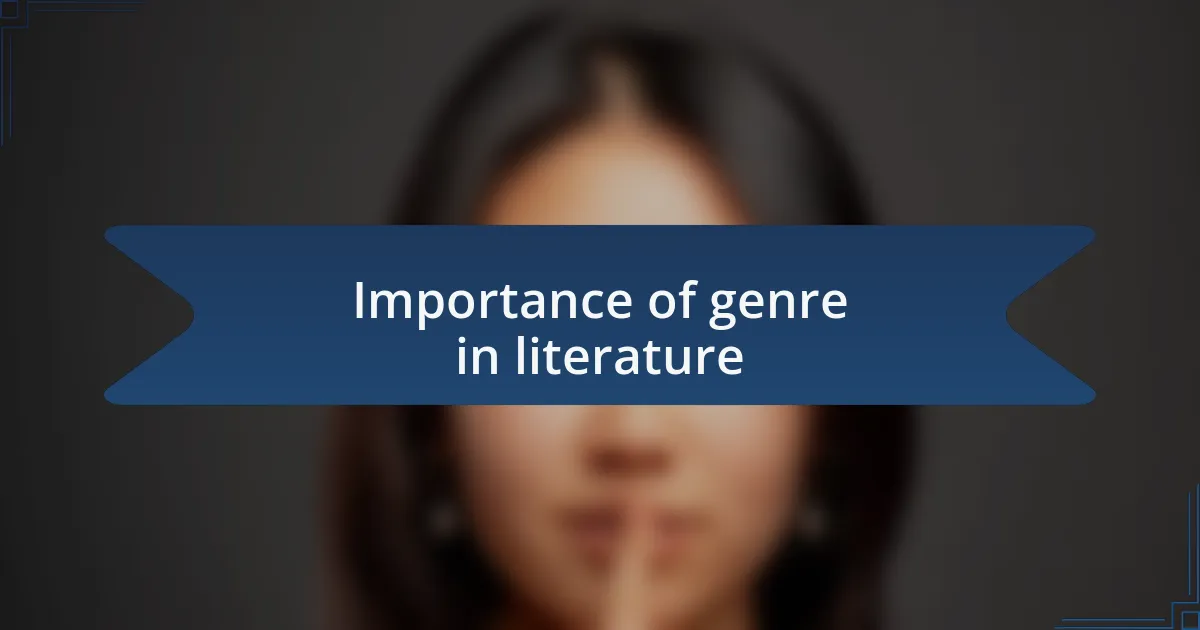Key takeaways:
- Genre fiction, especially mystery, serves as a window into human nature and societal norms, enhancing engagement and emotional insights.
- Agatha Christie’s novels explore fundamental themes like deception, social class, and morality, prompting readers to reflect on their values and perceptions.
- Christie’s storytelling techniques, including misdirection and character development, encourage critical thinking and deeper analysis of both fiction and real-life situations.

Understanding genre fiction
Genre fiction is a fascinating realm that encapsulates various themes, tropes, and storytelling conventions. When I first stumbled upon mystery novels, I felt an immediate connection; the thrill of piecing together clues almost felt like participating in a game. Have you ever found yourself so engrossed in a story that you started to guess the ending before you reached it? That engagement is part of what makes genre fiction so compelling.
I remember vividly the first time I read a classic Agatha Christie novel. It was as if she opened up a portal to a world where suspense and intrigue ruled. Each character felt meticulously crafted, like pieces of a larger puzzle waiting to snap into place. This experience made me realize that genre fiction isn’t just about entertainment; it gives us a lens through which we explore human nature and societal norms, often leading to deep emotional insights.
The beauty of understanding genre fiction lies in how it invites readers to explore not just the plots, but the layers beneath them. Why do we read about crimes and cozy mysteries? For me, these stories often reflect our innermost fears and desires—so, what do your favorite genres reveal about you? The process of deciphering these themes can be just as satisfying as unfolding a gripping plot, highlighting the enriching journey that genre fiction offers.

Importance of genre in literature
The significance of genre in literature is profound; it creates a framework that helps both readers and writers navigate the intricate landscape of storytelling. I often think back to how certain genres resonate with us at different stages of life. For instance, young adult fiction can feel like a mirror reflecting our own turbulent experiences, while historical fiction might provide a comforting escape to a time we yearn to understand.
Diving into a specific genre can also sharpen our analytical skills. When I first started reading detective novels, I became aware of the subtle clues and red herrings woven into the narrative. This engagement has taught me to think critically not only about the whodunit but about the storytelling craft itself. Have you ever considered how each genre serves as a unique lens through which we interpret the world around us?
Furthermore, genre fiction often connects us with like-minded individuals. I remember joining a book club focused on thrillers; it was enlightening to hear varying interpretations of the same narrative. This shared experience fostered not just friendships but a deeper appreciation for the genre’s ability to generate discussion. How enriching is it to realize that our favorite stories often spark connections and conversations beyond the pages?
Overview of Agatha Christie’s works
Agatha Christie’s body of work is nothing short of remarkable, with over 70 novels and numerous short stories that have captivated readers for generations. It’s fascinating to think about how each book invites us into a carefully crafted world filled with clever twists and memorable characters. I’ve always found myself drawn to her unique ability to make even the most complex plots feel accessible, raising the question: how does she create such immersive experiences?
When I reflect on Christie’s use of recurring detective figures, like Hercule Poirot and Miss Marple, I recognize how these characters offer us more than just a means to unravel mysteries; they provide insights into human nature itself. I vividly remember my first encounter with Poirot in “Murder on the Orient Express.” The way he methodically approached the investigation was not just intriguing; it encouraged me to reflect on my own thought processes. Have you ever paused to consider how our interactions with these iconic detectives might shape our own perceptions of right and wrong?
Moreover, Christie’s works don’t just operate as thrillers; they often explore deeper societal themes. As I revisited “And Then There Were None,” I was struck by how its exploration of guilt and justice resonates far beyond the traditional boundaries of detective fiction. Each reading experience reveals new layers, prompting me to ask: isn’t it exhilarating to uncover such profound truths hidden within seemingly straightforward plots?
Key themes in Christie’s novels
The theme of deception runs deeply through Christie’s novels, weaving a delicate tapestry that challenges our assumptions about truth. I remember vividly finishing “The Murder of Roger Ackroyd” and feeling completely blindsided by its shocking twist. It made me question how often we let our biases cloud our judgment. Aren’t you curious about how much we miss in our day-to-day lives simply because we believe we know the whole story?
Another prevalent theme in Christie’s work is the exploration of social class and its implications. In “Evil Under the Sun,” the interactions among the characters reveal the stark distinctions and repulsions that class can create, even among those present at the same holiday retreat. It struck me how Christie satirizes upper-class pretensions while still giving her characters depth. Have you noticed how her critical lens makes you reflect on contemporary social dynamics?
Finally, a fundamental element of her storytelling lies in the nature of justice and morality. In “The ABC Murders,” I found myself grappling with the question of whether justice truly prevails. The moral ambiguities presented through her characters prompt deeper reflections about our own values. Isn’t it fascinating that, in her plot twists, we often come to terms with our own beliefs about right and wrong?

Personal impact of Christie’s writing
Christie’s writing has profoundly shaped my understanding of human behavior and relationships. I still recall the first time I read “Murder on the Orient Express.” The way she intricately wove together the backstories and motives of each character made me reflect on the complexity of people’s lives. It left me wondering how often we judge others without knowing the entire story behind their actions.
One aspect of her work that resonates deeply with me is her portrayal of the ordinary intersecting with the extraordinary. In “And Then There Were None,” the growing tension and fear among characters evoke a sense of urgency that paralleled my own anxieties during challenging times. I found myself questioning how survival instincts and moral decisions can change when pushed to one’s limits. Isn’t it intriguing to explore what we might do in similar situations?
The emotional weight of her stories often lingers long after I’ve closed the book. Reading “The Mousetrap” ignited a particular sense of nostalgia for the joy of uncovering mysteries alongside friends. I realized that Christie’s ability to create suspense not only entertains but also fosters connection among readers. Have you felt that same thrill when sharing a twisty plot with someone you care about?

Insights gained from reading Christie
Reading Agatha Christie has given me a deeper appreciation for the art of storytelling and the nuances of perspective. I remember finishing “The ABC Murders” and being struck by how each character’s viewpoint shaped the plot. It made me realize that truth is often subjective. Have you ever considered how your own experiences color your understanding of events?
Her clever use of misdirection and red herrings taught me the importance of looking beyond the surface. When I encountered the unexpected twist in “The Murder of Roger Ackroyd,” it challenged my assumptions about trust and narrative reliability. I found myself wondering, how often do we overlook crucial details in our daily lives, simply because we think we know the outcome?
Christie’s work also opened my eyes to the complexities of justice and morality. In reading “Crooked House,” I was left grappling with conflicting feelings about right and wrong. It made me ponder: can the context of a person’s actions ever justify the means? These reflections enrich my perspective, adding layers to how I view not just fiction, but real-life situations, too.

Applying lessons from Christie’s stories
The lessons from Christie’s stories extend beyond narrative technique; they resonate with life’s complexities. For instance, while reading “Murder on the Orient Express,” I couldn’t help but reflect on the gray areas of morality. Have you ever found yourself in a situation where the right choice isn’t clear? I discovered that sometimes, the hardest decisions are the ones that teach us the most about ourselves and others.
Christie masterfully illustrates character development, which has influenced how I approach my own relationships. I recall connecting with Miss Marple’s keen observations and empathy in “The 4.50 from Paddington.” Her ability to see through pretense encouraged me to look for deeper truths in my interactions. What if we took a moment to consider the motivations behind someone’s actions before passing judgment? This shift in perspective can lead to more meaningful connections.
Moreover, the intricate plotting in Christie’s mysteries has shaped my analytical skills. I remember feeling exhilarated when piecing together clues in “And Then There Were None.” It was a reminder of the importance of curiosity and attention to detail. How often do we rush through life without pausing to truly analyze our surroundings? By applying Christie’s lesson on observation, I strive to engage with the world around me more profoundly.